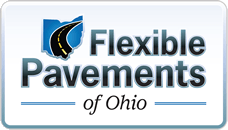Technical Briefings
Flexible Pavements of Ohio (FPO) offers a catalog of technical briefings on a wide range of topics related to asphalt pavement technology, which can be presented at your location upon request and mutual agreement. These presentations will be presented free of charge. The presentation topics can be accompanied by an opportunity for Q& A on the presentation or other topics related to asphalt pavement technology. Each briefing topic is intended to last approximately one hour in order to fit within a limited time frame. Multiple briefings may be combined to fill a longer period if desired. FPO can award certificates for professional development hours (PDHs). Each briefing equals one PDH.
The host agency is responsible for providing a suitable location for the presentation, notifying participants of the presentation and taking an attendance record for awarding PDHs. The list below can be used as a check list in requesting presentations.
Catalog of Technical Briefings for 2018-19:
See the list below or the PDF for descriptions of the presentations.
